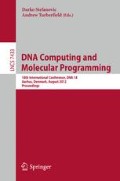Abstract
Chemical reaction networks (CRNs) formally model chemistry in a well-mixed solution. CRNs are widely used to describe information processing occurring in natural cellular regulatory networks, and with upcoming advances in synthetic biology, CRNs are a promising language for the design of artificial molecular control circuitry. Nonetheless, despite the widespread use of CRNs in the natural sciences, the range of computational behaviors exhibited by CRNs is not well understood.
CRNs have been shown to be efficiently Turing-universal when allowing for a small probability of error. CRNs that are guaranteed to converge on a correct answer, on the other hand, have been shown to decide only the semilinear predicates. We introduce the notion of function, rather than predicate, computation by representing the output of a function f:ℕk → ℕl by a count of some molecular species, i.e., if the CRN starts with x 1,…,x k molecules of some “input” species X 1,…,X k , the CRN is guaranteed to converge to having f(x 1,…,x k ) molecules of the “output” species Y 1,…,Y l . We show that a function f: ℕk → ℕl is deterministically computed by a CRN if and only if its graph { (x,y) \(\in{\mathbb N}^k \times{\mathbb N}^l\ |\) f(x) = y } is a semilinear set.
Finally, we show that each semilinear function f can be computed on input x in expected time \(O(\mathrm{polylog}\ \|{\rm x}\|_1)\).
The first author was supported by the Molecular Programming Project under NSF grant 0832824, the second and third authors were supported by a Computing Innovation Fellowship under NSF grant 1019343. The third author was supported by NIGMS Systems Biology Center grant P50 GM081879.
Access this chapter
Tax calculation will be finalised at checkout
Purchases are for personal use only
Preview
Unable to display preview. Download preview PDF.
References
Angluin, D., Aspnes, J., Eisenstat, D.: Fast Computation by Population Protocols with a Leader. In: Dolev, S. (ed.) DISC 2006. LNCS, vol. 4167, pp. 61–75. Springer, Heidelberg (2006)
Angluin, D., Aspnes, J., Eisenstat, D.: Stably computable predicates are semilinear. In: PODC, pp. 292–299 (2006)
Angluin, D., Aspnes, J., Eisenstat, D., Ruppert, E.: The computational power of population protocols. Distributed Computing 20(4), 279–304 (2007)
Aspnes, J., Ruppert, E.: An introduction to population protocols. Bulletin of the European Association for Theoretical Computer Science 93, 98–117 (2007)
Cardelli, L.: Strand algebras for DNA computing. Natural Computing 10(1), 407–428 (2011)
Condon, A., Hu, A., Maňuch, J., Thachuk, C.: Less Haste, Less Waste: On Recycling and Its Limits in Strand Displacement Systems. Journal of the Royal Society Interface (to appear, 2012); In: Cardelli, L., Shih, W. (eds.) DNA 17 2011. LNCS, vol. 6937, pp. 84–99. Springer, Heidelberg (2011)
Gillespie, D.T.: Exact stochastic simulation of coupled chemical reactions. Journal of Physical Chemistry 81(25), 2340–2361 (1977)
Jiang, H., Riedel, M., Parhi, K.: Digital signal processing with molecular reactions. IEEE Design and Test of Computers (to appear, 2012)
Magnasco, M.O.: Chemical kinetics is Turing universal. Physical Review Letters 78(6), 1190–1193 (1997)
Presburger, M.: Ub̈er die vollständigkeit eines gewissen systems der arithmetik ganzer zahlen. In: Welchem die Addition als einzige Operation hervortritt. Compte Rendus du I, Warsaw. Congrks des Mathematiciens des pays Slavs, pp. 92–101 (1930)
Soloveichik, D., Cook, M., Winfree, E., Bruck, J.: Computation with finite stochastic chemical reaction networks. Natural Computing 7(4), 615–633 (2008)
Soloveichik, D., Seelig, G., Winfree, E.: DNA as a universal substrate for chemical kinetics. Proceedings of the National Academy of Sciences 107(12), 5393 (2010)
Zavattaro, G., Cardelli, L.: Termination Problems in Chemical Kinetics. In: van Breugel, F., Chechik, M. (eds.) CONCUR 2008. LNCS, vol. 5201, pp. 477–491. Springer, Heidelberg (2008)
Author information
Authors and Affiliations
Editor information
Editors and Affiliations
Rights and permissions
Copyright information
© 2012 Springer-Verlag Berlin Heidelberg
About this paper
Cite this paper
Chen, HL., Doty, D., Soloveichik, D. (2012). Deterministic Function Computation with Chemical Reaction Networks. In: Stefanovic, D., Turberfield, A. (eds) DNA Computing and Molecular Programming. DNA 2012. Lecture Notes in Computer Science, vol 7433. Springer, Berlin, Heidelberg. https://doi.org/10.1007/978-3-642-32208-2_3
Download citation
DOI: https://doi.org/10.1007/978-3-642-32208-2_3
Publisher Name: Springer, Berlin, Heidelberg
Print ISBN: 978-3-642-32207-5
Online ISBN: 978-3-642-32208-2
eBook Packages: Computer ScienceComputer Science (R0)

